Table of Contents
Columbia Bicycles
Columbia was started in 1877 by Col. Albert Augustus Pope in Hartford, CT, becoming the first bicycle to be made in the USA.
The Pope Manufacturing Co., the owner of the Columbia brand, were headquartered in Boston, MA and manufactured most of its bicycles in Westfield, MA starting in 1887 until 2008.
By 1900 Columbia was the largest bicycle manufacturer in the world. Along the way it was also first to use coaster brakes, a diamond frame, spring forks and pneumatic tires. The Columbia brand survived continuously over various takeovers under the Columbia Manufacturing Company and only stopped making bicycles in 20061). Today, Columbia Manufacturing makes only furniture at the “One Cycle Street” address in Westfield.
Columbia Bicycles US relaunched in 2015 and appears to have disappeared by mid-2022. See: columbia bicycles archive.
Columbia Bicycle Taiwan continues to sell Columbia bicycles throughout Europe and Asia: acadia16.com.tw.
An Amazon Columbia Bicycle store continues to exist: amazon.
The early Columbia MTBs were uniformly bad. Side pull brakes, or “e-z cantilevers,” off-brand components, with single piece cranks on boat anchor heavy frames with only 10 speeds.
Yet this is what department stores
2)
were selling, such as Murray or Huffy, all of whom were racing to the bottom of what was left of the “Made in the USA” bike brand. Columbia persisted in making 10 speed klunkers well until 19913).
Interestingly, all MTB models only came in a single frame size, which differed model by model, until 1989 when one model had two sizes available.
info:
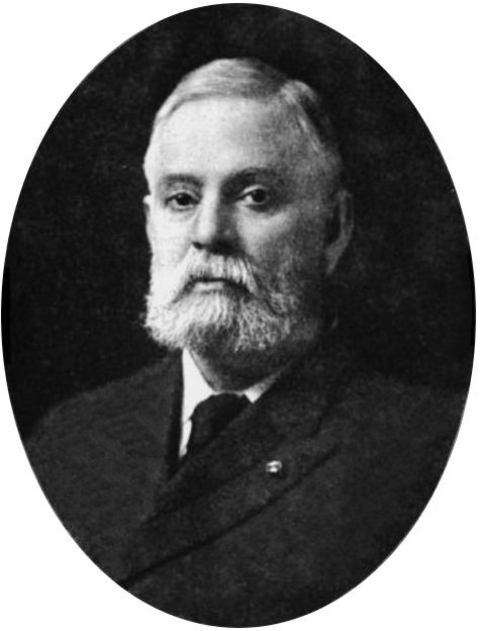
Albert Augustus Pope, ca. 1908
wikipedia
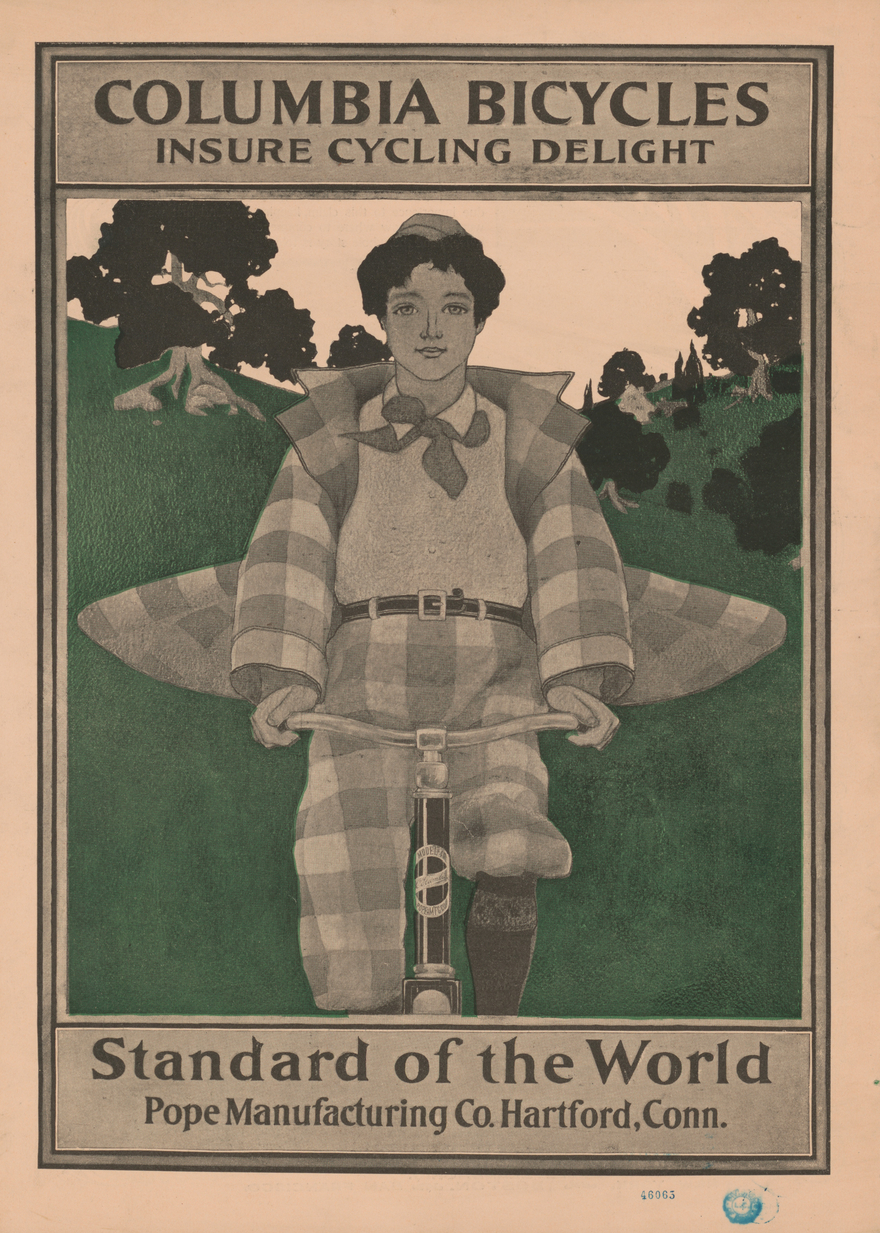
Harper's Weekly art by Maxfield Parrish, 1896
Library of Congress
1982 Clipper 10
The 1982 catalog lists a Clipper 10 All Terrain Cruiser, which looks like a geared klunker with front side pull brakes, rear drums, 26 x 2.25“ knobbies, and Texas Steerhorn handlebars. It looks quite sturdy, but it's 49 pounds. Doesn't deserve a timeline spot. By 1982, most American large bike companies knew what a mountain bike was. For example, 1981 Murray Baja, 1981 Sears Free Spirit or the 1982 Schwinn King Sting 10. This is the same Clipper 10 Beach Cruiser which Columbia sold in prior years, but with All Terrain bicycle marketing. The white-walls are cool, though. Too bad those didn't come with bigger knobbies.

1982 Clipper 10, from 1982 catalog
Vintage Columbia Bikes
1983 Ridge Runner
The 1983 catalog lists a Ridge Runner as a 10-speed mountain bike, with center pull brakes, mitsubishi tires4) and 23” only XL frame.
With gold, anodized bullmoose bars, rims, crankset and calipers. Columbia may have been late to the MTB party, yet they arrived in style. No other major manufacturer has ever shipped a production gold plated MTB, well, except perhaps Miyata's 1990 14k gold plated Mt. Century.

1983 Ridge Runner, from 1983 catalog:
Vintage Columbia Bikes
1984 Trailmaster
This Trailmaster's cantilever brakes are a big improvement over the prior year's calipers, despite 1983's gold plating. BTW, the brakes in this pic are a lower spec than the catalog (MAFAC copies vs Dia Compe's,) but they work just as well, and probably came stock. Note that the Trailmaster name was shared with the 1980->1982 Koski Trailmaster and the 1983->1990 Concord Trailmaster. Columbia changed the name of this model to Trailrunner in future years.
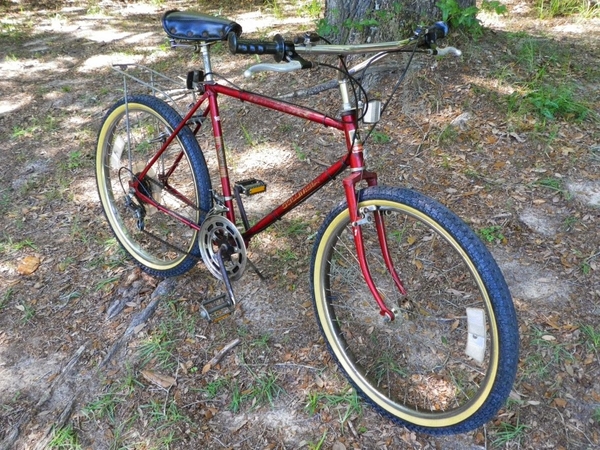
1984 Trailmaster
methodejappuy
1985 Trailrunner
10s, cantilevers, bullmoose bars. The inheritor of the Trailmaster name.
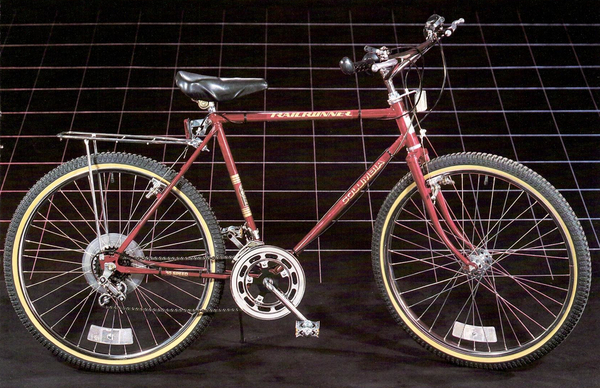
1985 Trailrunner,
1985 catalog:
Vintage Columbia Bikes
1987 Trailrunner
10s, bullmoose bars, easy cantilevers, portage strap!.
Easy Cantilevers are also known as scissor center pulls, inspired by the design of the 1984 Campagnolo Delta Brakes. (See: The Greatest Worst Brake Ever) Even though Campagnolo recalled these disasters immediately, many low end bikes started wearing these starting in 1985.

1987 Trailrunner, 1987 catalog:
Vintage Columbia Bikes
1987 MPL
“Ingenuity in action.” Those are not suspension seat posts and stems, but bellows sleeve protectors. And yes, the handlebars are merely inverted to match the aerodynamic theme with the sprocket disc cover. But what, really, does a shell enclosed saddle feel like? Maybe the theme is “waterproof”? Note the 5-speed internal hub, which required two shift cables to operate5), matched with a front derailleur and bulky chain tensioner.
MPL := Multi-Purpose Lightweight.
The ultimate city bike… touring and racing combined with mountain bike strength.
Not in the timeline, but deserves special mention.
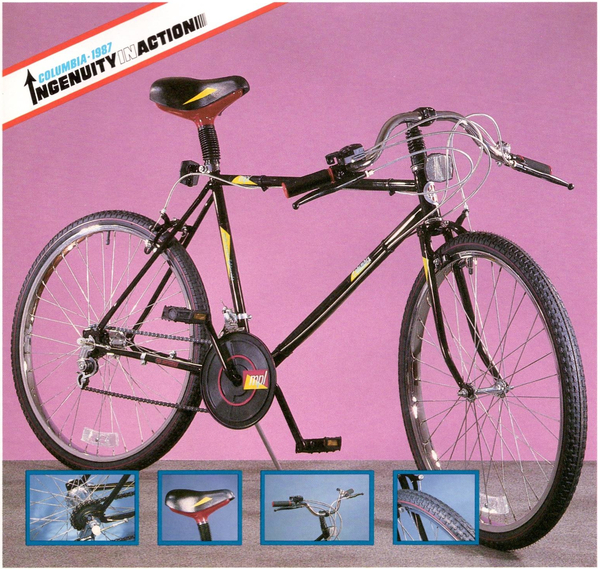
1987 MPL, 1987 catalog:
Vintage Columbia Bikes
1988 Mountaire
10s, side pull brakes, off-brand components.
The 1988 catalog has “A New Beginning” on the cover, referring to their most recent bankruptcy emergence, and to the fact they had even less money to improve their manufacturing processes. At this point they started to import many models. However, one item which they started making back in 1953 which proved successful was school furniture, which they continue to make to this date at the original Westfield factory.
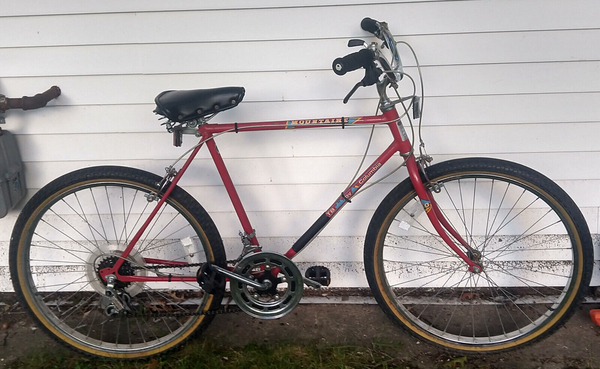
1988 Mountaire
ebay
1989 Trailrunner
Easy cantilevers, 12 speed, slingshot stem. Freewheel size updated to 6 speeds.
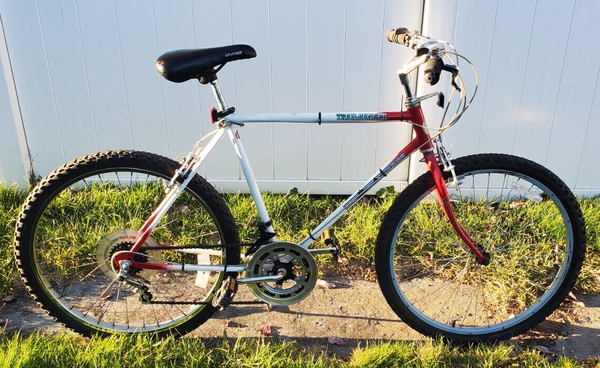
1989 Trailrunner
ebay
1990 Sable
18s, easy cantilevers, pump with pump peg.
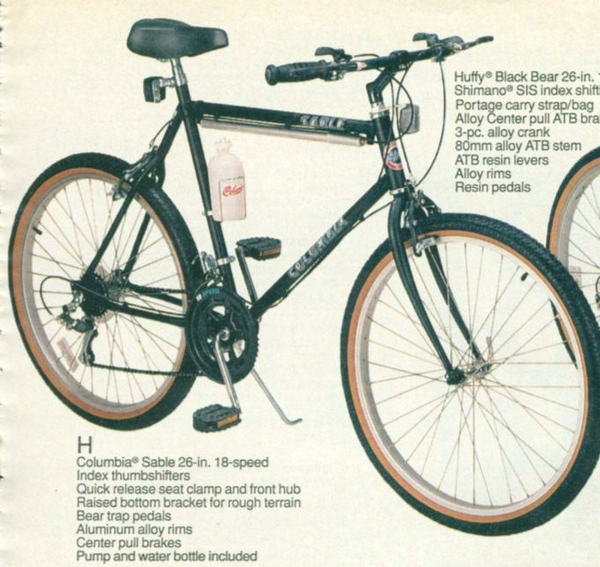
1990 Sable,
1990 J.C. Penny catalog
wishbookweb
1991 MTB 1800
1991? MTB 1800, 18s, MAFAC style cantilever brakes, wishbone seat stays, cable stops are brazed onto the frame but continuous cables (which give a mushier feel,) are used throughout. There is an Omega De Luxe MTB 1800 from the same era, with a very different frame logo style. Likely not a coincidence.
Date is guess work, as it's actually less evolved than the 1990 Sable, while sharing the same frame details.
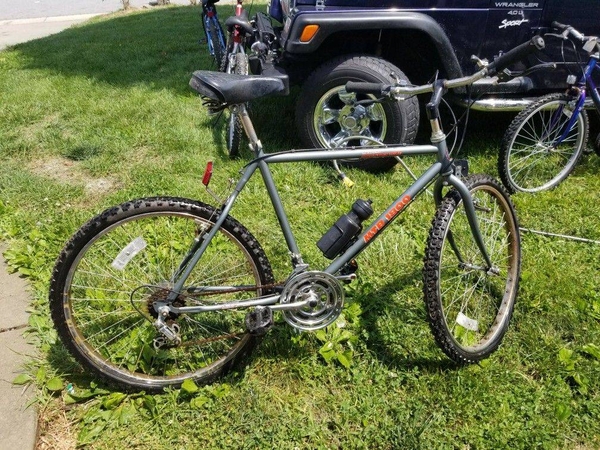
1991 MTB 1800
craigslist
